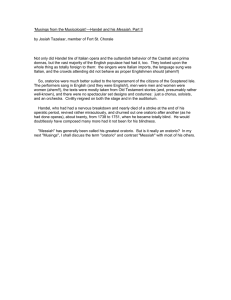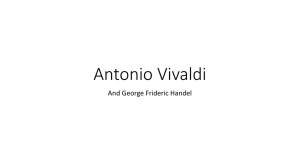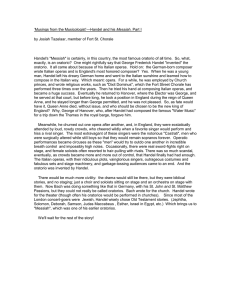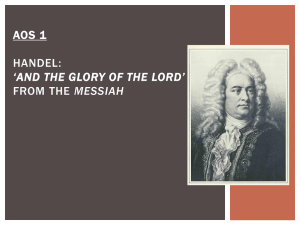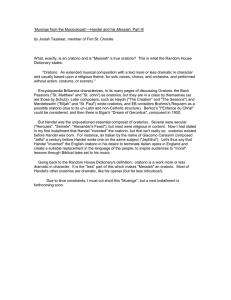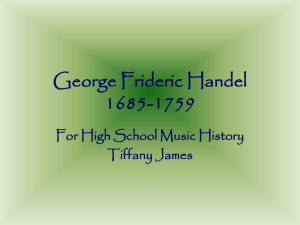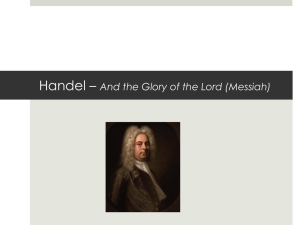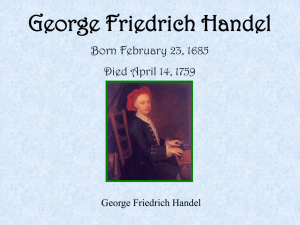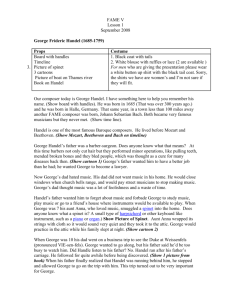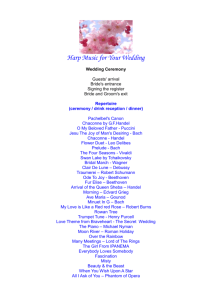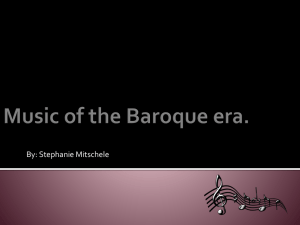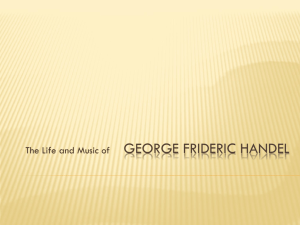CHAPTERS 15-16 George Frideric Handel and the Oratorio
advertisement
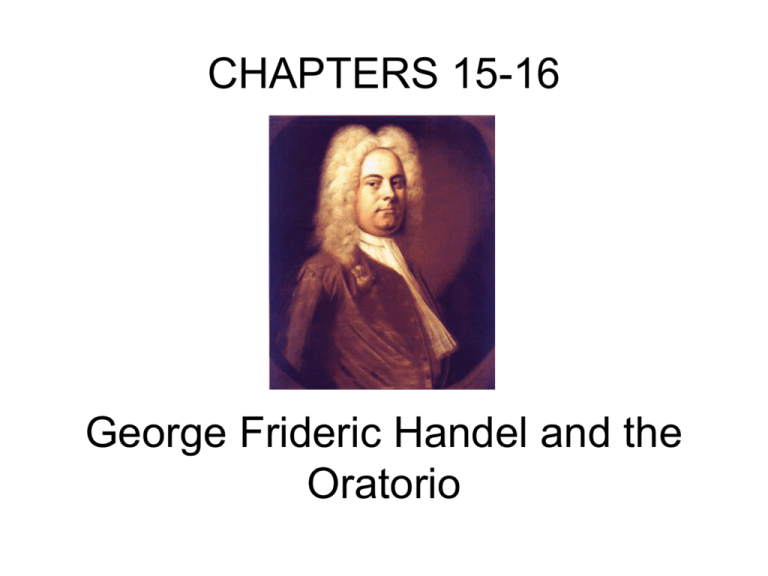
CHAPTERS 15-16 George Frideric Handel and the Oratorio ORATORIO • Oratorio – large-scale composition for chorus, vocal soloists, and orchestra • Usually set to narrative text • Different than opera – no acting, scenery, costumes • Most biblical stories, but not intended for religious services • First appeared early 17th century – Musical dramatizations of biblical stories GEORGE FRIDERIC HANDEL • 1685-1759 • Master of Italian opera and English oratorio • Born in Halle, Germany 1 month before Bach • Not from musical family • By age 9: showed talent, father allowed him to start studying • Age 11: composing, giving organ lessons • 12: father died • 17: Halle University, studied Law, left a year later • Became harpsichordist for opera house in Hamburg • 20: one of his operas produced • Handel: man of temperament, conviction – Argument with friend about who would play the harpsichord led to duel; botton on Handel’s coat saved him • 21: went to Italy, stayed 3 years, wrote operas • 1710: returned to Germany – Well-paid position as music director for Elector Georg Ludwig of Hanover – Asked for leave to London for opera performance, performance was successful, asked to go again, told he could as long as he stayed for a good amount of time • Stayed 1712-1759 • Became England’s most important composer Handel and the Italian Opera • The Italian Opera was mainly exotic entertainment. – Middle classes thought the mythological operas were absurd! • Aristocrats of London supplied the money for these productions. – (The Royal Academy of Music; until it folded after 9 seasons.) Handel has a breakdown… • Upon closure of the Opera companies, Handel has a nervous breakdown. – Handel goes to Germany to recuperate. – Even the King of Prussia states, “ Handel’s great days are over, his inspiration is exhausted, and his taste behind in fashion.” He’s not finished yet! • Returns to London, and starts writing Oratorios EXTENSIVELY. • He charges high prices for these “low-cost” productions. • Even attracts a middle class The Jealousy of the People… – All of his Oratorios were HIGHLY acclaimed. • “Messiah” -1741 (most famous) – Aristocrats and wealthy hate the notion that a foreign musician is attaining power and prominence. – They plot Handel’s demise. • Rip down concert posters, hoodlums assult concert-goers, aristocrats give private concerts and parties on Oratorio nights. Late in Life • 1753- Still conducting and giving concerts (He was almost completely blind!) • During his lifetime a statue was erected of him in the public park. • Dies in 1759 – About 3,000 people attend Handel’s Music Wrote a TON of music – suites, organ concertos, concerti grossi – but the core of his output were Italian Operas and English Oratorios. Ironically – All of his 39 Italian Operas were written in London! Handel’s Oratorios • Most deal with stories from the Bibles Old Testament. • NOT Church music. For paying audiences. • To be performed in public theaters. • Most had Plots & Characters (even though it was not a play) “Messiah” • Exception is the Messiah. Dealt with a New Testament subject without a plot. • The “Messiah” Oratorio was composed in only 24 days, but lasts 2.5 hours. • Was said by journalists to be “the finest Composition of Musick that ever was heard.” “Messiah” (cont.) • Performed yearly as a benefit for London Orphanages. • It was said that Messiah, “ fed the hungry, clothed the naked, fostered the orphan.” Messiah – Is in three parts. • Part 1) The prophecy of the Messiah’s coming and announcement of Christ’s birth. • Part 2) The sacrifice of Jesus and mankind's utter defeat when trying to oppose the Almighty. • Part 3) Expresses faith for eternal life from Christ, the redeemer. French Overture and Allegro Moderato • Messiah opens in a minor key. • Begins like a fugue in which the subject is passed from higher instruments to lower ones. • The tempo: Grave & Allegro Moderato – Tr. 46 and 47 Comfort Ye, My People • Between an Aria (soloistic) and Recitative • Based on verses from Isaiah: announcement that Jerusalem's people will no longer be exiled. • A heavenly voices commands them to return from the desert. • Pg. 186 tr. 48 Ev’ry Valley Shall Be Exalted • Describes the creation of a desert highway: God leads Jerusalem's people back to their homeland. • Pg. 187 Tr. 50 For unto Us a Child Is Born • Most JOYful music! • Celebrates the birth of a royal child whose name predicts salvation. • Pg. 188 tr. 51 Hallelujah Chorus • Possibly worlds most famous Choral piece. • Sudden Changes in texture happen throughout. • Handel takes this text from the Revelation of St. John which celebrates God as the Almighty and everlasting ruler. Wrap – up • Tomorrow will be a review day! • We will begin class by reviewing our music examples, then move onto multiple choice review.
